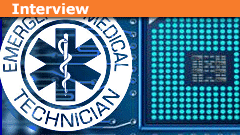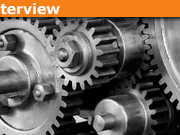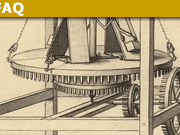Interview with an Electrical Engineer: Berkeman
Can you give us a brief history of berkeman?
I grew up in a military family (my dad was an Army colonel), so we moved all over the place when I was a kid, finally settling in Calistoga in the northern part of the Napa Valley, California, for my high school years. Being a military “brat” definitely has shaped several parts of my personality and my life. You get used to moving often and making new friends, you get used to learning about different cultures when you live in different countries, and you understand the importance of service to your family and to your community and to your country.
Living in the countryside near Calistoga during my high school years was wonderful. My buddies and I would ride our dirtbikes, hunt, fish, hike, and generally enjoy the country life. I feel very lucky that I ended up in that situation during the very formative years of high school. I was also very lucky that a new teacher came to Calistoga High School when I was there — he was a black belt in Kodenkan JuJitsu, and he started a dojo/club there based out of the high school. I worked my way up to 2nd degree brown belt before I graduated HS, and unfortunately have never gotten back to it. Sensei emphasized the philosophy of martial arts as much as he taught the physical arts, and I learned a great deal from him about service and honesty and honor. I have only had to use the physical arts a couple of times in self-defense, but I have used the philosophical concepts almost every day of my life. Thank you sensei :smile:
I did my undergrad BSEE at the University of California at Davis, and earned my MSEE at the University of Michigan. The weather climate in northern California is obviously very mild, so when I went to the U of M, all I had for a jacket was a down vest. As winter set in, I quickly went out and bought a giant poofy coat!
I worked for Bell Labs in Denver for a few years (see below), and then for HP in California for a few years. I then consulted as an EE for 5 years, working on some very interesting entrepreneurial projects with Silicon Valley startups. After 5 years of consulting, I was doing some consulting for Echelon Corporation when they were still a startup, and they made me an offer to hire on full time. That was about 23 years ago now! The work that I do now at Echelon is very challenging technically, and I enjoy that. I also very much enjoy helping out at the PF as a Mentor. I learn a lot of interesting technical information, in addition to helping to facilitate the learning of others. I feel privileged to have found the PF, and to have ended up being a contributing Mentor here. I am pretty strict in enforcing the PF Rules, though. I think we Mentors and Admins have them pretty well tuned to helping everybody learn how to learn. That has been a fundamental part of my education process, as you can tell.
What is it like living in the tech capitol of Silicon Valley?
The high-tech parts of it are great, and the crowded metropolis part is a hassle. If you are looking for a job as an EE, one of the best ways to do it is to cruise around in your car mid-day, and make note of the names of the companies with very full parking lots. Then look them up online to see if they have job openings that fit your background (they usually do).
And there are lots of great places to buy parts and equipment for your home projects and even your work projects (that you are prototyping in the hopes of making them real company projects). I frequent Frys Electronics, Halted, Anchor, and several other local parts stores. Funny story — I was at Halted Electronics one time, and saw that they were selling some of the graphics tablets that I had helped invent at HP many years prior. They were now on the surplus electronics racks! It actually made me feel good, knowing how many HP had sold and how near the end of the product’s life, they ended up on a classic Silicon Valley store’s surplus racks for sale. I bought one of course to keep in my workshop!
It even made the cover of the HP Journal many years ago — Article here
What got you started in Scuba Diving and what is your favorite place?
When I was in high school in Calistoga, one of the friends that I made through the JuJitsu club was a guy who was working as a young police officer in the Napa Valley. We were both very athletic and hit if off well. He already had his scuba certification, and he free dived (skin dive with just a snorkel) for abalone off of the north coast. He taught me how to free dive for abalone, and he taught me the basics of scuba diving in a friend’s backyard pool in Calistoga. I have to tell you, the first time you are told to take off your mask while sitting on the bottom of a pool breathing from a scuba tank, it is incredibly weird and uncomfortable! That first time I couldn’t take it, and had to surface to get it together. But now, it’s no big deal.
As for my favorite dive place, that has to be Hawaii. That is the only warm-water diving I’ve done, and it is wonderful. There is such a big difference between diving in a wetsuit (even free diving), and diving in only a speedo. There is so much more freedom diving in warm water. When I free dive, I get into a rhythm of a minute down and a minute up. If I spend more time down, it takes longer on the surface to recover, and it also pushes the safety envelope a bit too much for me. I often dive alone, so I need to be mindful of my safety margin. With others in the water with me, I’ve pushed the down time to a couple of minutes, but have been light-headed coming up. Not good when diving alone…
How did you become interested in engineering?
When I was a little kid, my dad used to spend time after our family dinners explaining how things worked to me. He used to pull out his pen and draw on the paper dinner napkins, showing me how things like levers and machines, and transmissions and differentials worked. I enjoyed the learning very much, and I’m pretty sure he got a kick out of explaining all those things to a bright kid. He was mostly mechanically inclined though, and his knowledge of electrical things and electronics was limited. Still, for a 6-10 year old kid, that didn’t matter much. My interest in electronics came a bit later.
One of the hardest decisions of my life came in undergrad when I had to declare either for the EE program or the Physics program. I honestly loved my physics classes more than my EE classes, but at the time I felt that the EE route was probably more reliable economically. I had plans for many years to go back and earn my physics degrees, though, and use that knowledge to help in a combined EE/physics startup…. Still may happen… :smile:
What were some of your biggest challenges in completing your Masters in electrical engineering?
The MSEE part was probably the easier part; the BSEE part was much more challenging for several reasons. The high school in Calistoga was fairly small, and I was able to graduate salutatorian without having to study very much. This meant that I didn’t have good study habits when I went off to college at UC Davis. So I got my butt kicked the first semester, getting a C in chemistry and not much better in Calculus. Yikes. That was a real wakeup call for me! I resolved to study better and harder, and bring my final GPA up as high as I could, given the low initial value from the first semester.
I buckled down and studied harder (and smarter), typically studying 40+ hours a week outside of classes. Things clicked much better with the extra effort, and by the time I graduated with the BSEE, I had my GPA back up to 3.67/4.0, with a 3.9/4.0 in technical classes. One of my fondest memories from undergrad was when I got a 97/100 on a technical-track undergrad physics midterm exam, and the average was 50/100 on the exam. I felt great, and that was part of my falling in love with physics. :smile:
By the time of my senior year, I was feeling much better about school, and had most of my classes under pretty good control (it still took a lot of work to do well, but the stress level was lower). I ended up being the chairperson of our Student IEEE branch, and helped to make the group pretty active. That included organizing several field trips to Silicon Valley high-tech companies (the companies paid for the tour bus for each trip, as a recruiting tool looking for new-hire candidates), and I was able to get back to working out in the pool several days a week. Senior year was good. :smile:
As part of the on-campus interviewing process, I interviewed with Bell Labs, and they invited me to fly back east for the next level of interviews. I was planning on going to grad school on my own to get my MSEE (probably in Southern California), but Bell ended up giving me an offer to join their OYOC (one year on campus) scholarship program, where they pay you to get your MS degree. I accepted, worked the summer at the Lab in Denver on PBX systems, did my MSEE year back in the snow at the University of Michigan, and then worked for Bell for a few years in Denver. In the end, I missed California too much, and moved to Silicon Valley to work for HP and then as a consultant.
So I have to say that the MSEE part of my education was the easier, less stressful part of my EE education. It’s very nice to have worked so hard and done so well in undergrad, so that Bell Labs was willing to hire me into their scholarship/work program.
As a Analog & Digital Design Engineer, what is your daily work day like?
I start each day like many folks, digging through e-mails and dealing with spam. Then I usually get onto the PF, and check the Mentor forums and then the EE forum and HH forums. My work efforts are divided between sustaining engineering (supporting products that we already ship, often in high volume), and new product development. The new product development work can consist of designing new stuff on my own (transceivers, comm transformers, power circuits, etc.), supporting our design teams (designing and building mixed signal emulation circuits), or supporting our manufacturing organization (building manufacturing test fixtures, etc.). The work is never boring, almost always challenging, and always interesting.
You’re also an EMT, what is that like and do you have an interesting story? Is this related to Newark CERT?
Yes, it’s related to CERT training experiences, much like the HAM radio experiences. I had wanted to upgrade my first aid and CPR skills to the EMT level for a long time, and in 2007, a local Fire Battalion Chief gave me information about a 2-week “EMT Boot Camp” offered by Unitek College in Fremont near where I live. My work and volunteer schedules couldn’t accommodate community college EMT classes, but I was able to take two weeks off from work to complete the Boot Camp, and earn my EMT certification. After passing the EMT national registry exam a week after the Boot Camp, I started working part-time EMT shifts out of San Jose, and also volunteering on the Medical Teams at a number of athletic events each year. These events include triathlons, bike rides, marathon runs, and other charity events. As part of my preparation for the volunteer events, I purchased my own personal AED (Automated External Defibrillator), and I used it to resuscitate one heart attack victim recently, who has recovered completely. Wonderful result. :smile:
You mention you are a “HAM Radio EC”. What is your history with HAM Radios?
Since I managed to put down roots in serious earthquake country, right over the Hayward Fault which is due to rupture soon (smart move, berkeman), I took our local CERT (Community Emergency Response Team) training under the local Fire Department, and started participating in our local disaster drills. The first thing that became obvious was that our CERT teams needed better communications between our own teams, and with the Fire Department, and that lead to all of our CERT Team Leaders becoming licensed HAM radio operators. The FCC did a great thing a few years ago and eliminated the Morse Code requirement for getting the basic HAM license. This has lead to a swell in the numbers of new HAMs, which has lead to a lot more people available and willing to help with emergency voice communication during disasters.
As my city’s EC (Emergency Coordinator), I am tasked with organizing and exercising our licensed HAM operators, as well as recruiting new interested HAM operators. We have been activated a few times here locally to help with difficult situations for Fire and PD and Hospitals, and we have been able to do good work for our “Served Agencies”. When all else fails, there is HAM radio!
Do you have a favorite thread at PF?
There have been so many great threads here (both technical and non-technical), it’s hard to pick. I think I would have to pick a thread in the EE forum that I started at a member’s request, after a thread where we discussed misunderstandings in circuit design. “The Art of Electronics” by Horowitz and Hill spends a lot of time talking about practical circuits, and the mistakes that we all make putting circuits together.
I started looking through the textbook casually one day out of a colleague’s bookshelf, and almost immediately saw an opamp circuit that I’d been having trouble with recently. Duh! I’d implemented the bias circuit wrong because they didn’t talk about that part back in my EE classes. And I looked a bit farther, and saw why a potentiometer based circuit that I’d built had gone unreliable a few years later. Duh again!
Needless to say, the textbook discussed in this thread has been very valuable to me and to potential EEs:
“Bad Circuits” Thread — https://www.physicsforums.com/showthread.php?t=178516
Is there a recent development in science/tech that excites you?
I think there are some very promising new technologies and treatments coming from the medical field. I’m hopeful that over the next decade or so, we will see a lot of progress in dealing with the more serious diseases and injuries. :smile:
Thanks for participating berkeman!
I have a BS in Information Sciences from UW-Milwaukee. I’ve helped manage Physics Forums for over 22 years. I enjoy learning and discussing new scientific developments. STEM communication and policy are big interests as well. Currently a Sr. SEO Specialist at Shopify and writer at importsem.com







This Interview has been moved to Insights
[URL]https://www.physicsforums.com/insights/interview-electrical-engineer-berkeman/[/URL]
Great read, very inspirational and I’m glad to have a well rounded experienced man like you to be one of our mentors!
It’s good to know that you have our backs–in more ways than one!
I would read one paragraph and would say to myself, “wow, he has this skill/does that/knows this, too.” And they just kept piling up…..
You’re a very well-rounded person with a lot of experience. Thanks for the interesting read :smile:
“It happened in the parking lot of the Santa Clara Swim Center, where I work out a lot. A woman collapsed and bystanders started yelling for help, and I had just parked my Suburban, so I went to help. She had no pulse, so I grabbed my AED and EMT jump bag from my Suburban, and myself and an off-duty ER nurse did CPR and used the AED to shock her back into an irregular sinus rhythm. By the time the paramedics got there, her pulse was back to 64. :smile:
The AED I have (Zoll AED Plus) has a small EKG display on the front, so you can get an idea of what is going on. AEDs will only deliver a shock to a patient when they are in certain kinds of cardiac arrest. They analyze the heart rhythm to figure out if a shock is appropriate, and they tell you out loud if a “shock is advised”.
[url]http://en.wikipedia.org/wiki/Automated_external_defibrillator[/url]
:smile:”That is awesome, berkeman.
”
Some of the consulting I did way back was on some biomedical devices. Definitely interesting stuff. I think if I were a young buck, I’d probably steer more toward biomedical product development. But I don’t know if it’s practical for me now.
It’s funny, as I did more EMT work, I found that I really enjoy the patient contacts. Even with difficult patients, I still enjoy working with them and helping them out. I think that if I knew back in undergrad what I know now about enjoying patient contacts, I probably would have gone into emergency medicine, either as a doc or a nurse. :smile:
”
Yeah, no kidding! One of the themes of the Bell Labs OYOC scholarship program was to make you a more “rounded” person. So they asked you to do your MSEE year in a different state than you did your undergrad. In fact, they recommended that you try to go to a school that was pretty far away from your home state, and it just turned out that the U of M was far away and a good looking school.
I made it a point to room with local guys when I was there, to get a better feel for the place than if I lived on my own there. I ended up in a 2-bedroom apartment with 3 local guys, and it was a blast. :smile:
“berkeman, was this at an event you volunteered for, or did you just happen to have it nearby?
How do these things work – does the AED tell you whether to do CPR or to try defibrillation?”
It happened in the parking lot of the Santa Clara Swim Center, where I work out a lot. A woman collapsed and bystanders started yelling for help, and I had just parked my Suburban, so I went to help. She had no pulse, so I grabbed my AED and EMT jump bag from my Suburban, and myself and an off-duty ER nurse did CPR and used the AED to shock her back into an irregular sinus rhythm. By the time the paramedics got there, her pulse was back to 64. :smile:
The AED I have (Zoll AED Plus) has a small EKG display on the front, so you can get an idea of what is going on. AEDs will only deliver a shock to a patient when they are in certain kinds of cardiac arrest. They analyze the heart rhythm to figure out if a shock is appropriate, and they tell you out loud if a “shock is advised”.
[url]http://en.wikipedia.org/wiki/Automated_external_defibrillator[/url]
:smile:
”
I think there are some very promising new technologies and treatments coming from the medical field. I’m hopeful that over the next decade or so, we will see a lot of progress in dealing with the more serious diseases and injuries. :smile:
”
berkeman, have you ever considered combining your engineering knowledge with your EMT experiences to develop these new technologies?
”
Totally agree :cool:
Good one. Sort of inspirational. Can relate myself to more than one part. Was confused between physics and EE (although my physics never was very good). Now doing EE and the first year so far (in 2nd semester) has been very bad. Hope I can pull it off nicely from here onward like berkeman did. :)
“As part of my preparation for the volunteer events, I purchased my own personal AED (Automated External Defibrillator), and I used it to resuscitate one heart attack victim recently, who has recovered completely. Wonderful result. :smile:”
berkeman, was this at an event you volunteered for, or did you just happen to have it nearby?
How do these things work – does the AED tell you whether to do CPR or to try defibrillation?
How did you end up at Michigan for grad school? It’s kind of a long way from California.
During my first two years there, my roommate was an EE grad student who grew up a couple of hours from Ann Arbor. I grew up less than a day’s drive away.
I am totally disillusioned! I thought you were a youngster, actually you are a old f@rt like Om Cheeto and I!
Congratulations on your volunteer work!
I will never understand how people can cram so much in the same amount of time I have. Geez, I can barely answer my emails and make a tea while you go twice around the world.
Awesome Berkeman!!!
”
At first, I thought he was just another 16 year old genius, on a motocross.
[CENTER][IMG]http://physicsforums.bernhardtmediall.netdna-cdn.com/images/customavatars/avatar8921_1.gif[/IMG][/CENTER]
Later, I was like; “How could anyone that young know so freakin’ much about ‘tronics, and be so wise?”
Berkeman is simply awesome!!
My BUDS class,USN was a bit of a different sequence.. The instructor tossed all your equipment to the 15' deep end of the pool, and you had to dive down, and put it on, Tank, mask, clear the mask underwater, May West vest, and so forth. Strange, but I never felt truly secure, till I got the weight belt on, and stabilized the flotation factor… Still have my gear, after moving off Long Island, just lost the urge, after moving to upstate, and doing fresh water dives.